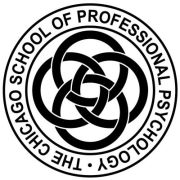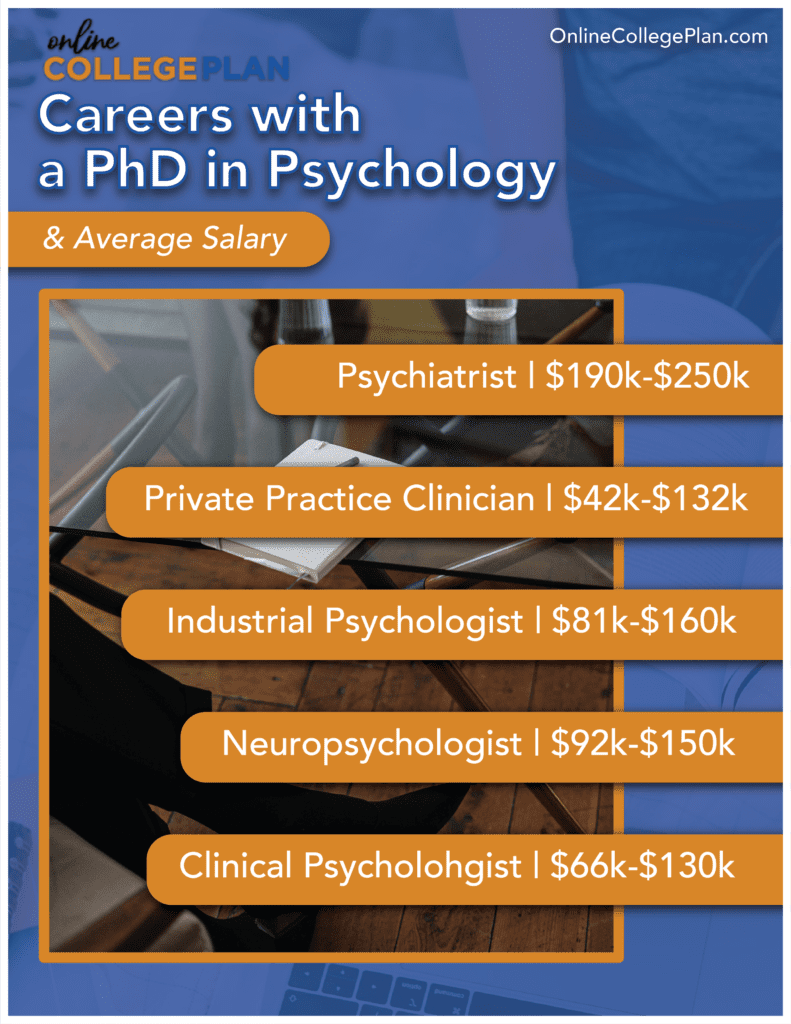Top Online Ph.D. Programs in Psychology
Find your degree


Psychology is a diverse and many-faceted field that has grown exponentially in recent decades. Most broadly speaking, psychology is a social science dealing with questions of our behavior and the inner workings of our minds.
Humans have sought answers to psychological questions for all of written history. But it wasn’t until relatively recently that many schools of professional psychological thought began to flourish and offered opportunities for more people to apply psychological understanding in many new and exciting ways.

The three major applications of psychology include psychological research, clinical psychology, and counseling psychology. Though a host of related fields expand opportunities for psychologists even more.
By employment numbers, educational and career counseling positions are some of the most common jobs related to psychology. Applied behavioral analysis is a form of applied psychology that is often used as support for behavioral modification and special education (most particularly in working with those with autism spectrum disorder). Meanwhile, organizational and industrial psychology applies psychological principles and investigation methods to business and human resources problems.
The rate of expansion of opportunity in psychology remains steady, with three percent growth predicted through 2029. However, for professionals who enter the field of substance abuse, behavioral disorders, and mental health counselors, there will be ample opportunities for work. Counseling is forecasted to grow exponentially by 25 percent through 2029. What does this mean for you? Psychology majors who want to pursue a graduate or doctorate degree can do so while working in their chosen field and getting paid well. The average annual salary in these entry level positions is $46,240.
In short, there are more opportunities to apply a honed understanding of psychology than ever before. And with the explosive growth of online education, the options for where you can advance your knowledge in psychology have never been so wide and varied.
Methodology
For this year’s ranking of the best online doctoral programs in psychology, there were more options than ever. And we hope that our ranking reflects the many theoretical and applied paths that one can pursue in the field of psychology.
Our ranking looked at close to 30 fully online or hybrid doctoral programs related to psychology. We looked a wide range of metrics for each program we considered, and then plotted the relative values of each metric using the following methodology:
we compared tuition, acceptance rates, and graduation percentages. With this information gathered from the National Center for Educational Statistics (NCES) College Navigator, we created a points-based system to rank each school.
We featured the schools in descending order, with the top school at the top of the list. If the points were a tie, the school with lower tuition rates won. If there was a tie between tuition, the school with the higher acceptance rate took a higher spot on the leaderboard.
Graduate Tuition/Fees
Less than $10,000/year – 3 Points
$10,001-$20,000/year – 2 Points
More than $20,000/year – 1 Point
Applicants Admitted
Less than 25% – 1 Point
25% to 50% – 2 Points
More than 50% – 3 Points
Graduation Rate
50% or Greater – 3 Points
25% to 49% – 2 Points
Less than 25% – 1 Point
| School | Tuition (estimate per year) | Admission Percentage | Graduation Percentage | Points |
| Liberty University | $8,000 | 56% | 47% | 8 |
| Texas A&M University | $19,000 | 69% | 82% | 8 |
| Loyola University – Chicago | $19,000 | 67% | 74% | 8 |
| Alaska Pacific University | $12,000 | 89% | 45% | 7 |
| Amridge University | $13,000 | 100% | 33% | 7 |
| Regent University | $16,000 | 86% | 57% | 8 |
| Northcentral University | $18,000 | 90% | 29.9% | 7 |
| University of West Georgia | $18,000 | 59% | 45% | 7 |
| Felician University | $19,000 | 86% | 47% | 7 |
| University of North Florida | $22,000 | 72% | 67% | 7 |
| University at Buffalo | $25,000 | 57% | 75% | 7 |
| University of Tennessee – Knoxville | $30,000 | 78% | 72% | 7 |
| Michigan State University | $30,000 | 66% | 81% | 7 |
| Grand Canyon University | $11,000 | 41% | 41% | 6 |
| Arizona State University | $12,000 | 86.47% | 4% | 6 |
| Southern California Seminary | $16,000 | 100% | <20% | 6 |
| Fielding Graduate University | $17,000 | 20% | 80% | 6 |
| Nova Southeastern University | $21,000 | 48% | 58% | 6 |
| The Chicago School of Professional Psychology | $21,000 | 34.2% | 69% | 6 |
| Boston University | $55,000 | 25% | 88% | 6 |
Liberty University

Lynchburg, Virginia
Tuition: $8,000
Points: 8
Located in Lynchburg, Virginia, this large religious university has a robust online program. Liberty University offers several online degree programs in counseling and psychology, including an intensive Ph.D. in Psychology.
Liberty’s Ph.D. program will deepen your understanding of human behavior and mental health. While the program is entirely online, Liberty boasts an extensive network of professionals able and willing to provide quality education in psychology.
As a Christian university, the Ph.D. in Psychology curriculum includes perspectives through a biblical worldview to help students develop an ethical understanding and appreciation. The program requires 60 credit hours. Students can also specialize in developmental psychology, industrial/organizational practices, social psychology, theology, or stick with the general track.
Texas A&M University

College Station, Texas
Tuition: $19,000
Points: 8
As one of the top research institutions in Texas (and the country), it’s no surprise that Texas A&M University (TAMU) makes it on to our list. The school offers a variety of excellent undergraduate and graduate programs, both on-campus and online.
The Ph.D. in Psychology is offered through the College of Liberal Arts and requires students to complete 96 hours of coursework to earn a master’s and a doctoral degree. If you already have a master’s from another university, you can complete the doctoral program with at least 64 hours.
Loyola University – Chicago

Chicago, Illinois
Tuition: $19,000
Points: 8
Falling just behind TAMU is Loyola University – Chicago, a private university with over 16,000 students. Loyola offers a fully online Ed.D. in School Psychology specially designed for those interested in becoming a school psychologist. The Ed.D. program promises students that they will become leaders in the educational community and inspiring mentors upon completion.
The program is available to complete part-time in two years so you can learn on your own time. However, students must stay continuously enrolled during their studies to earn the doctorate, meaning you have to be enrolled in at least one course each semester.
Alaska Pacific University

Anchorage, Alaska
Tuition: $12,000
Points: 7
Alaska Pacific University (APU), though far from the lower 48 states, offers an undergraduate BA in counseling psychology as well as a blended doctoral program for psychologists. Their Doctor of Psychology program focuses on counseling psychology and provides a curriculum relevant to those who have a master’s degree or are already working in the field.
Courses are offered through evening classes to be flexible with students’ schedules. However, students must travel to APU every six weeks for on-campus intensives.
APU’s psychology program is designed for anyone in Alaska, all the way to its most remote corners. Upon graduation, students are licensed to practice in the state of Alaska. The program is relatively new and is still seeking American Psychological Association accreditation.
Amridge University

Montgomery, Alabama
Tuition: $13,000
Points: 7
Amridge University is a private, religious institution that offers two online psychology programs: a Ph.D. in Professional Counseling and a Ph.D. in Marriage and Family Therapy.
You can complete either program in four years as a full-time student or part-time over several more years. Most of the coursework is available online, though a few classes are strictly in-person. The research-based curriculum is intensive and requires 60 semester credit hours. Upon completion, students will receive a counseling degree with a Christian-based background.
Regent University

Virginia Beach, Virginia
Tuition: $16,000
Points: 8
Located in idyllic Virginia Beach, Regent University is a mid-size Christian university that offers a plethora of specializations with its Counseling & Psychological Studies program. Programs are available at all levels, and students can study pastoral counseling, trauma and crisis, educational psychology, research, and much more.
Students must complete 51 credit hours for the Ph.D. in Counseling & Psychological Studies. Regent also offers an Ed.D. in Educational Psychology for those interested in the field’s academic side and forming environments conducive to learning. The Ed.D. in Educational Psychology requires at least 66 credit hours and features various concentrations, including adult education, Christian education leadership, K-12 school leadership, and more.
Northcentral University

La Jolla, California
Tuition: $18,000
Points: 7
Northcentral University is an entirely online school that offers various degrees at the bachelor’s, master’s, and doctoral levels. The school has a robust psychology department and provides a BA or a Ph.D. in Psychology for those looking for more knowledge and education.
Northcentral’s Ph.D. in Psychology program engages students in case studies and real-life situations. Students can specialize in one of 10 areas of interest, including addictions, gerontology, trauma and disaster relief, and more.
The program challenges students to improve their critical thinking and understand and put into place modern research methods. It requires 60 credit hours over 20 courses, and students can complete the program within four years. Classes start online every week to fit everyone’s schedule.
University of West Georgia

Carrollton, Georgia
Tuition: $18,000
Points: 7
Home to more than 13,400 students and more than 85 programs at the bachelor’s, master’s, and doctoral levels, the University of West Georgia (UWG) is a regional institution with a lot to offer. While the school’s Ph.D. in Psychology program is only offered in-person, there is an online Ed.D. in Professional Counseling and Supervision available for those who wish to complete their education online.
UWG’s Ed.D. program aims to prepare professionals to help their clients and their surrounding community through effective counseling practices and strong leadership skills. The curriculum builds upon what you previously learned to set you up for advancement in your career.
To graduate, students must defend a dissertation that either evaluates existing programs or examines issues in counseling. The program requires 60 hours of coursework and includes courses in ethical leadership, quantitative research, and more.
Felician University

Lodi, New Jersey
Tuition: $19,000
Points: 7
Felician University is a private, religious institution with about 12,000 students enrolled across various undergraduate and graduate programs. Students living on the East Coast can enroll in Felician’s blended Psy.D. (Doctor of Counseling Psychology) program. The hybrid online offering features some online and some in-person classes to fit busy schedules.
Students must complete a total of 88 credits to receive a master’s and a doctoral degree. If you have a master’s degree, the program only requires you to complete 73 credits. Students must complete three years of practicum experience and an internship for one year full-time or two years part-time.
University of North Florida

Jacksonville, Florida
Tuition: $22,000
Points: 7
Located in Jacksonville, Florida, the University of North Florida (UNF) is a mid-sized public institution with more than 16,000 students. UNF has a strong nursing program and even features a particular Doctor of Nursing Practice degree focused on psychology and mental health. This DNP in Psych-Mental Health program is open to anyone with an M.S. in Nursing and national certification as a nurse practitioner.
The program aims to give students a deep dive into mental health and how they can help as nurses. It is entirely online and requires 53 hours of coursework to earn the degree. While campus visits are not necessary, they offer the course with on-campus visits once each semester.
The University at Buffalo

Buffalo, New York
Tuition: $25,000
Points: 7
The University at Buffalo (UB) offers various financial aid opportunities, resources, and counseling to online students to have everything they need to receive a quality education.
While UB’s main psychology programs are all in-person, the school offers several Doctorate of Nursing Practice (DNP) degrees in psychological studies and specializations. The Psychiatric/Mental Health DNP prepares nurse practitioners for work in the mental healthcare spectrum. They offer the program both fully online and hybrid, with online and in-person classes available.
Students can earn their DNP degree full-time in a year-and-a-half or part-time in about three years. The program requires 35 credit hours and will give nurses a new specialty to advance their careers.
The University of Tennessee – Knoxville

Knoxville, Tennessee
Tuition: $30,000
Points: 7
Located in a large city and offering numerous educational opportunities, the University of Tennessee – Knoxville is a robust institution with vital online programs. The University of Tennessee – Knoxville’s Ph.D. in Clinical Psychology program offers students the ability to specialize in teaching and research areas. The program can be completed full or part-time and is flexible to each student’s needs.
Professors will train students in assessment practices, psychotherapy, and more. The clinical work and practicums completed will give you the tools to succeed in whatever specialization you choose. The school also offers a fully online BS in Social Work.
Michigan State University

East Lansing, Michigan
Tuition: $30,000
Points: 7
Michigan State University (MSU) is a public research university and one of the world’s largest higher education institutions. The school offers various in-person, hybrid, and online degree programs that fit every type of student.
MSU’s psychology department is one of the top choices in the United States, and its academic support is unparalleled. In the Ph.D. programs, doctoral candidates have the opportunity to do their own research.
Each student pursuing a Ph.D. in psychology must complete a dissertation. Afterward, graduates are ready to pursue leadership roles in schools, private practices, businesses, and more.
Grand Canyon University

Phoenix, Arizona
Tuition: $11,000
Points: 6
Grand Canyon University (GCU), a private Christian institution, is located in beautiful Phoenix, Arizona, but you can study and pursue one of its many programs from anywhere. The school offers a broad spectrum of programs with leaders in the field, teaching every major type.
GCU has an extensive online psychology program that allows you to earn a Ph.D. in Psychology while specializing in different areas. Doctoral candidates can study cognition and instruction, industrial and organizational psychology, educational technology integration, and performance psychology.
The Ph.D. in Psychology program is one of the most affordable available, and students can transfer in doctoral credits to save more money. Doctoral candidates must complete 60 credit hours to graduate. Undergraduates can participate in the school’s Bachelor of Science in Counseling with an Emphasis in Addiction, Chemical Dependency, and Substance Abuse program.
Arizona State University

Tempe, Arizona
Tuition: $12,000
Points: 6
Arizona State University (ASU) is one of the largest public colleges in the United States, but the close-knit environment it offers in each program is unparalleled. With more than 200 degrees offered entirely online, ASU is one of the top institutions to earn a degree remotely.
Undergraduates can opt for a BA or BS in psychology or forensic psychology while
ASU offers a Doctorate of Behavioral Health (DBH) online clinical program that helps advance master’s level clinicians. The program features a hands-on approach to behavioral interventions and medical literacy.
The 100% online format allows candidates to work or manage their schedules as they need. The DBH requires 84 credits, including a 400-hour internship for students licensed in medical, behavioral, and allied health. Students can take classes focused on primary care, pathophysiology, psychopharmacology, and more.
Southern California Seminary

El Cajon, California
Tuition: $16,000
Points: 6
Located in Southern California’s paradise, Southern California Seminary is a private, nonprofit institution with various degrees available in-person and online. The small campus has just over 200 students, so each person at the school feels like family.
The Ph.D. in Psychology offered at Southern California Seminary integrates theology to prepare students for ethical practices in the real world. The program aims to give students tools to work in churches, private practices, and organizations.
Southern California Seminary’s Ph.D. in Psychology is available online and on-campus. Students can learn remotely for the majority of their studies. They can return on-campus to take Advanced Therapeutic Interventions, a hands-on course offered at the end of students’ first year. Students will also go through an in-person evaluation for the Psychological Testing Lab course.
Fielding Graduate University

Santa Barbara, California
Tuition: $17,000
Points: 6
Fielding Graduate University is a California-based graduate school with a substantial psychology program. Its Ph.D. in Clinical Psychology is the only distributed learning program recognized by the American Psychological Association. With distributed learning, students and professors can learn and teach from anywhere in the world at any time.
The Ph.D. in Clinical Psychology features online and in-person meetings. Most of Fielding’s faculty consists of professionals still active in the field, giving those interested in specific concentrations extra insights on real-world applications.
Fielding also offers a Ph.D. in Media Psychology, which also features online and in-person curricula. Media psychology involves the study of technology and how it affects human behavior. The program includes different concentrations, including audience engagement, positive psychology and media, and the social impact of mobile media and immersive technology.
Nova Southeastern University

Fort Lauderdale, Florida
Tuition: $21,000
Points: 6
Nova Southeastern University is the place to start if you’re looking for a bachelor’s degree in psychology. Applicants can apply for the Ph.D. program when applying for the B.S. program, locking in their entire education. If you’re only looking for the Ph.D. program, Nova Southeastern University’s clinical psychology program teaches essential skills for the field.
Accredited by the American Psychological Association, the Ph.D. in Clinical Psychology program allows students to focus on one of seven concentrations. Areas include forensic psychology, neuropsychology, psychodynamics, and more.
Chicago School of Professional Psychology

Online
Tuition: $21,000
Points: 6
The Chicago School of Professional Psychology has several campuses across the country, focusing on different psychology areas. They offer numerous programs online for those with flexible schedules, including eight undergraduate degree programs in psychology.
The school also offers online PhDs in business psychology, behavioral analysis, international psychology, and counselor education. It also has an Ed.D. in Educational Psychology and Technology. With this program, students learn how technology affects human behavior and how to help individuals in educational institutions navigate the media.
Candidates can complete a Ph.D. program in three years full-time or at their leisure part-time. There are additional opportunities for real-world experience through required field internships. The programs aim to give students what they need to succeed in their specialized areas.
Boston University

Boston, Massachusetts
Tuition: $55,000
Points: 6
Boston University’s (BU) psychology program may come at a hefty price tag, but it’s one of the country’s top degree opportunities. At BU, students have access to a global network of professionals across a wide range of fields and can choose from a BS or BA in psychology during their undergraduate years. The private research university also offers three Ph.D. programs in psychological studies: Brain, Behavior, and Cognition (BBC), Clinical Psychology, and Developmental Science.
The Ph.D. in Clinical Psychology has been accredited by the American Psychological Association since 1948 and has a longstanding history of producing professional leaders. BU uses a clinical-scientist model to train candidates for careers in academics, science, and more.
In the BBC program, doctoral candidates learn about the brain and what stimuli affect their behavior. Students take an innovative approach to studying psychology from an early childhood standpoint in the developmental science program.
Online Doctorate of Psychology FAQs

Can I get a PhD in psychology online?
If the above ranking isn’t proof enough, yes, you can most certainly gain a doctor of philosophy (Ph.D.) in psychology online. In fact, a higher number of Ph.D. programs in psychology are available fully online than any other type of doctoral program in psychology.
Why is this? Because Ph.D. degrees are research doctorates. This means that the central aims of Ph.D. programs are to prepare students to teach at the university level and to contribute original research to their field of study. As opposed to other doctoral types that often require in-person training of applied skills (in the case of applied doctorates), a larger portion of Ph.D.’s occur on your own time researching for your dissertation. Of all the types of doctoral degrees, Ph.D.’s may be the best suited to fully online study.
Just looking at the ranking above, there are highly regarded online Ph.D.’s in a number of psychology fields.
Do APA Accredited Online PhD Psychology Programs Exist?

When you’re looking for a university to attend, there are a few forms of accreditation of which you should be aware. Regional accreditation is the “gold standard” of accreditation for universities as a whole. If a university is regionally accredited, your credits should transfer to most other regional universities, and the university has proven that they meet high standards in a wide range of measures.
On top of regional accreditation, individual programs or schools within a university may be programmatically accredited. Programmatic accreditation looks only at a single type of program — for example nursing or business — and offers a judgment on whether or not that department in the university or individual program is “up to snuff.”
In doctoral psychology and counseling programs, there are two “gold standards” for program accreditation. These accreditations include the American Psychological Association accreditation for programs in psychology and the Council for Accreditation of Counseling and Related Educational Programs (CACREP) accreditation for counseling programs.

Over the years, the APA has struggled with how to evaluate online psychology programs. Many online programs that started to obtain accreditation from the APA were later put on probation. One exception is Fielding Graduate University (located in our ranking above), the first university to gain full accreditation from the APA for a largely online program.
CACREP accreditation for counseling degrees is more understanding of online degrees, and many of the above doctoral programs in counseling are CACREP accredited.
So the short answer is that, yes, there are a handful of APA approved psychology programs that are fully online. A caveat to this is that if you are looking at counseling programs instead of a degree with psychology in the title, you should be looking for the CACREP accreditation. And many fully online programs hold CACREP accreditation.
What is the difference between a Ph.D. and Psy.D.?

At the doctoral level, there are many types of degrees you can gain. This is because a doctoral study is often so heavily specialized, that a unique degree is needed to mark what your degree entailed. A random sampling of doctoral degree types includes doctor of engineering (D.Eng.) degrees, doctor of psychology (Psy.D.) degree, doctor of nursing practice (DNP) degrees, and many others.
The primary distinction between types of doctoral degrees is that some are research doctorates and some are professional doctorates. In a research doctorate program, some of the primary aims of the course of study are to prepare students to teach at the university level as well as to create original and valuable research in the field in which they study. A central component of a research doctorate is often a dissertation. A dissertation is a several-hundred-page document of original research that a doctoral candidate “defends” in front of a panel of experts before graduation.
In a professional doctorate, students also do plenty of research, but the primary goal is not to prepare future researchers, but rather experts of applied knowledge within their field of study. Professional doctorates are still terminal degrees in a field, but they place greater emphasis on preparing doctoral candidates for a job outside of academia.

The distinction between a professional doctorate and a research doctorate is at the heart of the difference between a Ph.D. and Psy.D. degree. Ph.D.’s in psychology are research degrees that require dissertations and prepare the next generation of researchers in academia (if the recipient chooses to follow that path). Psy.D.’s are professional doctorates that tend to focus more on on-the-job skills. For this reason, Psy.D. degrees often focus on one career route in psychology such as clinical psychology, counseling psychology, or school psychology.
How Much Does a Psy.D. Program Cost?

Though there has been a recent backlash to the decades-long rise in higher education costs, higher education in America can be quite expensive. With this said, education is almost always a good investment, particularly in a field that can be applied like psychology. Education costs are also some of the most variable of other major purchases. Some degree programs cost a few thousand dollars per semester, while others cost a few tens of thousands of dollars a semester.
Generally speaking, doctoral programs are more expensive than undergraduate programs. This is likely due to the higher level of expertise the university has to supply — through instructors — for students at the doctoral level, the lower number of students to split the program cost in doctoral programs, and the cost of entities like research centers.
With that said, doctoral candidates have several unique ways to offset costs. In in-person or hybrid programs, many doctoral students will receive a student financial aid package that includes a teaching assistant position. In exchange for helping to teach some lower level classes, teaching assistants get most or all of their tuition offset. Additionally, research grants can help to support individual portions of a students course of study.
To answer specifically, among the online doctoral programs listed in our ranking above, annual tuition ranges from $8,000 to $55,000. This shows the dramatic range of prices for study at the doctoral level. It also shows that if you shop around you can often find a program that is no more expensive than many undergraduate programs.
Is a Psy.D. a Doctor?

Used as part of an academic title, “doctor” means the someone that has achieved the highest level of study in a given discipline. In this sense nurses with a degree in Doctors of Nursing Practice are considered to be doctors in the same manner as archeologists that have Ph.D.’s in Archeology. There are two doctoral-level degrees given to psychologists: doctor of psychology (Psy.D.) degrees, and doctor of philosophy (Ph.D.) in psychology. Recipients of both degrees are doctors in the sense that a DNP, a D.Eng., or a DBA is a doctor.
If you’re wondering whether those with Psy.D. degrees are considered medical doctors, the answer is no. Medical doctors hold Doctor of Medicine (M.D.) degrees.
For the purposes of becoming a clinical psychologist, counseling psychologist, or educational psychologist, all state licensure boards accept two degree types: Ph.D.’s in psychology or Psy.D. degrees.
One aspect of this that can be a little confusing is that clinical psychologists often work in medical settings, and they have a doctoral degree. So — yes– they are doctors of psychology, and –yes– they can work in medical settings, but Psy.D. recipients are not medical doctors that hold an M.D. degree.

Best Careers for Psychology Majors

Psychology doesn’t just work with behavior but studies the mind and how it works. If you like helping people and advancing your understanding of the human brain and body, psychology is the major for you. The field offers so many career opportunities in numerous specializations.
Before you head out into the world of psychology, it’s essential to narrow down your interests to pursue a career that fits you. Here are some of the best jobs for psychology majors:
Psychiatrist
Average Annual Salary Range: $190,000 to $250,000
Psychiatrists are advanced psychologists that evaluate, diagnose, and treat mental disorders. They can prescribe medicine or psychotherapy treatments to help their clients. Psychiatrists can make a lot of money, but they first need to attend medical school and complete a four-year residency.
Private Practice Clinician
Average Annual Salary Range: $42,000 to $132,670
Have you ever thought about being your own boss? As a private practice clinician or therapist, you can treat clients out of your home. Most clinicians start with a master’s degree but often earn a doctorate to strengthen their reputation. The salary starts small but builds as you market your business and reach more clients.
Industrial/Organizational Psychologist
Average Annual Salary Range: $81,000 to $160,000
Many clinicians specialize in industrial and organizational psychology, which involves helping companies keep their employees healthy and motivated. The job market for these types of psychologists is very lucrative now as companies worldwide want happy and hard-working employees.
Neuropsychologist
Average Annual Salary Range: $92,000 to $150,000
If you enjoy studying the brain and how different factors affect its systems, neuropsychology is perfect for you. This lucrative career involves performing cognitive tests, working with drug addicts, and even consulting brain injury victims.
Clinical Psychologist
Average Annual Salary Range: $66,000 to $130,000
Clinical Psychology is one of the largest career fields in psychology, and the jobs are high-paying and satisfying. The best positions require a doctoral degree in addition to an internship.
More from OnlineCollegePlan
To learn more, you can visit our pages dedicated to Online Doctorate Degree and PhD Programs. Also, be sure to check out The Ultimate Guide to Online Colleges.
Related Rankings:

